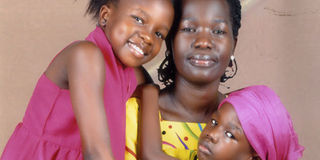Teaching our children their mother tongue

What you need to know:
Tough feat. Teaching your children their local dialects is as important as it is difficult. Brian Mutebi finds out how some parents have gone about it.
Imagine your children being able to communicate with everybody else but their relatives. Wondering how that could happen?
Well, inter-tribal marriages, modern formal education and the use of foreign languages such as English among other factors may result into children finding themselves in the middle of several languages.
Usually, they adopt the most commonly used language at home which may not be their mother tongue, especially where their parents don’t speak the same language. So, how do you prevent that from happening? Four parents share their tips;
Joachim Bukenya, director Child Evangelism Fellowship of Uganda;
“My wife and I limit the use of English to the office. At home, we only speak Luganda. We may use a few English phrases such as “Thank you”, but we endeavour to limit the use of English. We feel that our children should know their culture.
We do not want them to live a faceless life, and to be strangers in their motherland. We teach our children Luganda so that they don’t get embarrassed when they meet other family members and cannot speak their mother tongue.”
Dorothy Kamugisha, businesswoman;
“We employ a maid who understands our mother tongue, Kinyarwanda, so that the children can learn the language early. They interact with children from the neighbourhood too, so they come home speaking Luganda as well.
It is not bad for them to speak Luganda, except that we want them to learn their mother tongue too.
When, for example, my daughter speaks to me in Luganda, I will say in Kinyarwanda, “Pardon, I did not understand what you said”. She will heed the message and repeat what she said in Kinyarwanda.
We also talk to them and tell them to be proud of who they are, that it does not matter whether one is Rwandan or Acholi, they are beautiful the way God created them.”
Dennis Mbabazi, Systems Administrator, Makerere University;
I’m a Munyoro and my wife is a Mugisu so you can imagine what language our children speak.
They actually speak more Gisu than Lunyoro because they spend more time with their mother and our maid, who is also Gisu.
Besides, I’m not so good at Lunyoro because I have spent most of the time here in Kampala, but I try to teach them what I know, say when doing homework or playing. I’m hopeful that they will gradually learn Lunyoro too.
We have a rule at home that the moment we get home, it is our mother tongue, Langi not English that we use. That helps the children to learn it. It is kind of forced learning given that they speak English at school but gradually they cope with it. We consider teaching children their mother tongue important because it gives them a sense of belonging and identify to their culture.
Of course they do not get it that fast but gradually. Our older boy for example who is 12 is fluent in Langi but not the little ones. For example, I might speak to one in Langi but he responds in English.
There I get to know he may not be able to speak Langi yet but at least he understand it, and gradually he will grasp it. We also try we get maids who can speak Langi because they are always with the children.
Then we make a resolution every beginning of year to teach our children their mother tongue and at the end of the year give presents to those who have excelled.”
Jennifer Okaka
Human Resources Manager, Feed the Future




